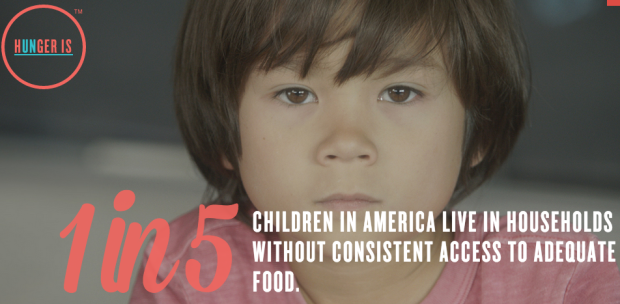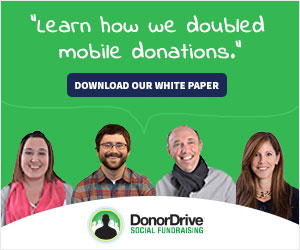
Image: HungerIs.org
Several years ago, I left my cushy advertising job to serve the Peace Corps in Bangladesh, one of the poorest countries in the world where poverty is a way of life. Leprosy was still a health concern as beggars felt that having this disfiguring disease was a boon – a way to convince people to give them more money. There was actually a black market for the sale or rental of infants. I met a mother who told me that she could earn twice as much in a day begging with a child as she could work in a factory making clothing.
Poverty was pervasive and omnipresent. Over time, it became the background – the wallpaper of my life in the country. I’m embarrassed to say that after some time, I too stopped seeing the human struggle around me. Children in disheveled or nonexistent clothing sitting or playing in the dirt on the side of the road became part of the landscape. My emotional heartstrings had been pulled in so many ways that they were out of shape, an elastic band that had lost all pliability from being overstressed.
One day, I was on a train from a relatively large town to a small one-road village. The distance was roughly 60km (37 miles) but the train ride took hours. On the train a young girl, no more than four or five, came into the car and started begging for money. Not wanting to face the truth of the situation this child was in, I kept my gaze out the window and avoided eye contact.
She stopped at my chair and looked at me. She stood for a moment without saying a word and then reached out to touch me. I suppose, like many others had before her, she wanted to feel what my strange colored skin would feel like.
I looked at her and our eyes locked for a brief second until a business man from across the train jumped up and started yelling at her. He grabbed the conductor and, against my admittedly weak protests, escorted her to the end of the car.
At the next stop, she was sent off the train.
As the train pulled away and the dust cloud settled, I could see her small frame sit down on the platform, carefully untie her scarf and start counting her change. Four or five years old and she was not the least bit concerned about being thrown off the train and left alone in the middle of nowhere.
I think about her often now that I have my own children roughly the same age, especially when they act like they’ve been completely abandoned when I simply walk into the next room.
I thought about that little girl the rest of the trip as I watched the verdant countryside pass. When we arrived at our destination, I got up from my seat and inserted myself into the churning machine of people to get off the train. I felt like one of those toothpaste bottles that are mechanically fed into a single stream – bumping and jarring into each other until one bottle makes it through the narrow passage.
The station was crowded. It was close to Eid, the Muslim holiday that marks the end of Ramadan, and people were traveling to spend the holiday with family. As I was jostled along, I could see an obstacle in front of me that was parting the crowd like a rock in the river.
When I approached, I realized that it was a woman lying on the bare concrete of the train platform. From her type of dress, I could see that she was a widow. Her face was streamed in tears and she looked up at the crowd with empty eyes devoid of all hope. It was clear she hadn’t eaten in many days.
My fellow passengers were walking around her, avoiding looking at her the same way I had avoided the little girl on the train. With growing horror, I looked around at the indifference and recognized the same emotions in myself. I saw people walking by, carefully avoiding the pure suffering; locking their humanity somewhere deep in their soul.
My own latch unhinged at that moment and my eyes looked directly into the eyes of suffering. Too weak to speak out loud, we locked eyes and I saw her journey. A poor girl from a small village, her family had married her off at a young age. They had saved everything they had for her dowry and married her into a slightly higher class. Her husband was kind and fair but her in-laws never fully accepted the girl from the poor family. When her husband died young, they no longer thought of her as their responsibility and she was left on her own. Illiterate and a woman, getting a job was not a possibility. She took to begging on the streets and her health deteriorated to the point where she was left on a train platform, too weak to lift her own head.
Her story was not unique. I had met many other young widows who shared this same narrative.
Looking into the woman’s sad and dejected eyes, I could see the pain and frustration of becoming invisible – ignored. I sat with her for a while, protecting her from trampling feet.
Once the crowd had dissipated, I got up, walked over to the banana walla and purchased four bananas. Two of the bananas I peeled immediately and fed to her. Too weak to even lift her arm, I smashed the banana in my hand and fed it to her – small bite by small bite. Once she had eaten two I became concerned about what would happen if her stomach suddenly filled with food. I found another beggar woman and made a deal – she could eat one banana if she fed the woman the other banana after the next call to prayer.
“What’s the point?” asked the second beggar woman, “this woman is as good as dead.” I gave the bananas to the station master and asked that he only give her the second one once she fed the first to the woman on the floor.
I went home that night and cried. I cried for the injustice. I cried for all the suffering. Mostly, I cried because I realized what I had become – cold and uncaring.
I got out my suitcase and started packing my bags. What had this place made me? Now that I see, what can I do to help? I am only one person – how can I even begin to make a difference?
Through my tears and frantic packing, I began to sense something happening outside my house. I heard something – was it singing?
I opened the shutters to the window and saw a crowd of people in front of my house. They had candles and were all singing the famous Bhupen Hazarika’s Manush Manusher Jonya:
Humans are here for humanity
Life is here to live
Why can’t we give our fellow man a bit of sympathy (oh, my friend)
Curious, and a bit weary of a crowd outside my house, I cautiously went out to see what was going on. All of these people had heard about my actions at the train station – actions any one of us would have taken. It was some kind of mass awakening, a moment in time when we all opened our eyes and saw the suffering. These people too wanted to help, but they didn’t know how and they felt helpless in the face of the massive problem at hand.
And there were so many of them. Each one wondering what one person can do. This was a great lesson for me: one person can spur a movement, but it will take many people all working together to make a big difference in the world.
Fast forwarding several years, I now work as the Executive Director of The Safeway Foundation. Safeway is a grocery company in the business of feeding people and when we found out that one in five Americans are living in food insecure households, it just frankly made me mad. Here, in a country with so much surplus and waste, we have children going to school hungry. And so many of them. Almost 17 million children in America live in these households – that could fill Disneyland over 400 times.
Safeway and The Safeway Foundation have decided to step up to this issue in a big way. We have started a new program – Hunger Is to address the issue.
Viola Davis, the beautiful and accomplished actress, is our spokesperson and she speaks from the heart as someone who grew up hungry herself.
As the people of my village in Bangladesh all came to see what they could do to help, Americans are responding to our campaign. There is a virtual crowd of people surrounding our house – all wanting to help. What makes this campaign different from any other campaign is the community aspect. There is a role for everyone. Sure, we ask for donations at the register (and any chance we get!), but there are many other ways to participate. You can volunteer at your local food pantry or donate some food. You can write a letter to your local school urging them to adopt universal breakfast during class time. You can “like” us on Facebook or retweet us to your followers. You can tell your own story and experience with hunger to help us remove some of the stigma of this hidden issue.
Attention @Safeway shoppers: Retweet if you donated to help fight childhood hunger in America #HungerIs #ThankYou
— Hunger Is (@HungerIs) April 20, 2014
All of us have a role to play in eradicating hunger for America’s children. Will you open your eyes and your heart and join us?
About the author: In addition to being Executive Director at The Safeway Foundation, Christy Duncan Anderson lends her immense talents and experience in philanthropy to our own Editorial Advisory Board. We are so lucky to know her!
Christy also has some very helpful tips for nonprofits who are looking for corporate partners in this post.









